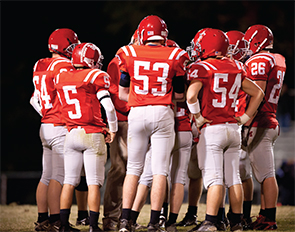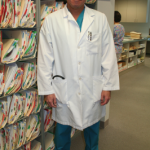
Image Credit: Rena Schild/shutterstock.com
Nathan Wei, MD, FACP, FACR, admits that he didn’t exactly agree with the amount certain things were encouraged in his family. “Aspects such as academics and music were focused on so much,” he says. “I wanted to break out from that upbringing. I wanted to add in more of what I wanted to do.” And that meant sports. It began in high school and ultimately had him playing for Swarthmore College’s football team and its JV basketball squad, as well as throwing the javelin.
Still, today, he takes it easy—if by easy you consider the fact Dr. Wei admits he can still tear it up in extreme workouts, such as P90X and Insanity, in his mid-60s. And he takes that attitude to his rheumatology work at Arthritis Treatment Center in Frederick, Md.
“My wife kids me, saying, ‘You should have gone into orthopedics,’” he says. “I’m approaching athletic injuries and the problems boomer athletes face from the perspective that I want to help them avoid surgery. A lot of my research has been
on stem cells, platelet-rich plasma and arthroscopic techniques that can help them stay active. They’re like me—they love to work out, exercise, do all sorts of active things, but without needing to have surgery. I have a passion for helping people like this.” In fact, he is the only rheumatologist he knows of who is a member of the Arthroscopy Association of North America.
Another interest inspires his work—family. “My sister developed RA about 25 years ago,” he explains. “She was also very active. … What brought it to my attention is she had to give up tap dancing, which was something she really liked. She had seen a podiatrist and an orthopedist, and my other sister said, ‘Take a look at her—she can’t straighten her elbow.’ I saw she had a lot of swollen joints, and I knew right away she had RA.”
Unfortunately, his specialty’s focus hit close to home again. “My son was playing travel soccer when he was 10, and he went from being a very good little soccer player to not being able to really play,” Dr. Wei says. “We found out it was juvenile ankylosing spondylitis. A friend I went to school with was a chief of pediatric rheumatology at a hospital. We got him on the right stuff, and he’s now 23 and has been in complete remission since the age of 11-and-a-half.”

Dr. Wei
These personal examples have given Dr. Wei more of a sense of purpose, he says. “You realize these diseases are common and how important it is to get [patients] into remission as quickly as possible,” Dr. Wei says.
“I was trained at the NIH as a clinical researcher and maintain that in private practice. I’m driven to try to be a part of new and better therapies.”
He uses arthroscopy as an investigational tool, looking at biopsies inside the joint before and after treatment to see changes that occur at the molecular level.
Preparing for Kickoff
Considering his football background, you can smile when he says he begins a work- day with co-workers in a “type of huddle.” Says Dr. Wei, “We want to go through what patients we’re going to see and what kind of service we’ll need to perform.”
He also wants to ensure the environment hasn’t changed from day to day. “From what our office looks like to the way we handle patients, we want it to send out the message of ‘professional,’” he says. “It’s easy to lose sight of it, but you need to think about the image you’re projecting.”
He sees about 20 patients a day and, with new patients, he wants to get to the heart of what their goals are and ways to match them. He also thinks it’s critical to connect. “You hear about doctors just typing away,” he says. “You need to have eye contact. That impersonal attitude doesn’t have any place at our office. We don’t even have voice-mail. Whether you’re calling in or you’re being diagnosed, you deserve attention.”
He believes attention is a two-way street. If a patient is non-compliant, he shows patience—but only so much. “What we do first is try to talk to them about why it’s important to be compliant,” he says. “Eventually, [we send] a letter.” If it continues? “I discharge them,” he says. “We’re wasting everyone’s time. The point of my job is to get people better—if they don’t listen to me then things probably aren’t going to change.”
Feeling Good
Dr. Wei admits his athletic aspirations have changed. He has given up on the goals of youth of a triathlon and considers it a good task to try and maintain his current fitness level into his 70s. If you’ve ever tried to get through P90X, I think you’ll likely admit that he isn’t exactly taking the easy route.
“I like the way being active makes me feel,” Dr. Wei says. “I’ll continue to work on helping patients have that feeling, too.”
Eric Butterman is a Texas-based writer. Contact him at [email protected]


